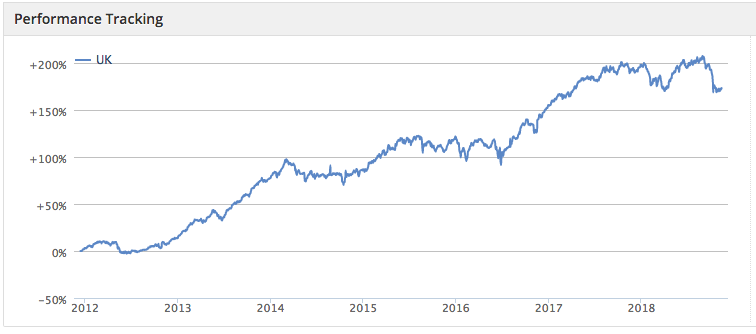10 value shares that are moving higher
14th November 2018 13:10
by Ben Hobson from Stockopedia
Research has shown the power of buying cheap shares just as their prices are beginning to strengthen. Using this methodology, Stockopedia's Ben Hobson picks UK shares that fit the bill.

Buying undervalued shares in the belief that they'll rise in price is the stock-in-trade of value investors. It's also one of the most successful and vigorously tested strategies in investing. But while value strategies are shown to work over the long-term, it's also true that they endure spells of painful underperformance.
So it's no surprise that researchers have looked for ways of getting smoother returns from value strategies. One of the most compelling findings is that you can reduce wild volatility by looking for stocks that already have momentum behind them.
The pain of value investing
Back in the 1990s, a well-known British fund manager called Tony Dye raised eyebrows when he warned that the market was overpriced. With the FTSE 100 at around 4,000 points, Dye slashed his clients' exposure to equities. But as the dotcom bubble inflated, some started complaining that he was being far too pessimistic.
While many others raced to buy speculative and increasingly pricey technology and telecoms stocks, Dye's fund performance slumped. He was ridiculed in the City and ended up getting fired by his firm, Phillips & Drew.
Within months of course, Dye's predictions proved correct as the market collapsed. Phillips & Drew hadn't even had time to reverse his strategy. Lucky for them too, because the firm was catapulted from the bottom to the top of the pension fund performance league table as the tech crash unfolded.
This was a classic illustration of one of John Maynard Keynes' famous quotes: "Markets can remain irrational longer than you can remain solvent." Although in Dye's case, the market remained irrational longer than he could stay employed.
Dealing with volatility
Over the past 30 years researchers studying the forces of stockmarket returns have formed a consensus around the power of mixing value with momentum to manage this volatility. Academic-turned-fund manager Josef Lakonishok was one of the main players in this movement. His research showed the power of buying cheap shares just as their prices were beginning to strengthen.
More recent studies by influential investors like Cliff Asness of AQR Capital and Wes Gray of Alpha Architect, have reinforced the view that a combination of value and price momentum can improve returns and smooth volatility over time.
One of the strategies that we track at Stockopedia seeks out companies that show the signs of having both value and momentum. It looks for firms that are well priced against their growth rates (using the price/earnings-to-growth, or PEG ratio) and seeing their share prices begin to reach new highs. Although the strategy has come under pressure recently, it's long-run performance has been strong.

Source: Stockopedia Past performance is not a guide to future performance
Here are some of the companies that currently qualify for the strategy rules, sorted by their PEG ratios.
| Name | Mkt Cap £m | Price/ Earnings to Growth Ratio (PEG) | % vs 52-week High | Sales £m | 1-yr Relative Price Strength |
|---|---|---|---|---|---|
| Norcros | 176.2 | 0.22 | -6.60 | 300.1 | +32.0 |
| Mission Marketing | 47.7 | 0.23 | -5.83 | 154.9 | +28.5 |
| Staffline | 344.3 | 0.27 | -9.41 | 1,011 | +19.5 |
| T Clarke | 35.1 | 0.27 | -8.64 | 321.9 | +18.0 |
| Carr's | 150.4 | 0.33 | -4.99 | 369.6 | +19.3 |
| Cohort | 172 | 0.36 | -2.33 | 111.8 | +15.2 |
| Pearson | 7,108 | 0.43 | -6.49 | 4,331 | +37.1 |
| DFS Furniture | 478.4 | 0.43 | -9.60 | 870.5 | +24.5 |
| Dart Group | 1,455 | 0.45 | -7.08 | 2,392 | +75.3 |
| iEnergizer | 228.2 | 0.47 | -7.69 | 122.1 | +204.2 |
Source: Stockopedia Past performance is not a guide to future performance
This value and momentum approach tends to gravitate towards smaller-cap stocks, although the education group Pearson and the logistics and travel operator Dart Group both pass these strategy rules.
Elsewhere, the list is led by the bathroom and kitchen products supplier Norcros, communications agency Mission Marketing, recruitment firm Staffline and building services business T Clarke.
Smoother returns
In the current market conditions, there are questions about whether the momentum trade, which has been so powerful in recent years, is breaking down. In glamorous, fast growing shares those question might have merit. But with smaller, relatively cheap stocks that are beginning to catch attention, momentum can be a useful indicator.
A combination of appealing valuation and positive price strength are hallmarks of some of the world's most successful investors. In tandem, these two factors can point to stocks with classic turnaround profiles - where the shares are bouncing back from a period in the wilderness.
Most investors shun them, and there is no doubt that careful research is needed. Yet cheap stocks on the move may well offer a smoother way of capitalising on two of the strongest drivers of returns in the stock market.
About Stockopedia

Stockopedia helps individual investors beat the stockmarket by providing stock rankings, screening tools, portfolio analytics and premium editorial. The service takes an evidence-based approach to investing, and uses the principles of factor investing and behavioural finance to help investors make better decisions.
Interactive Investor readers can get a free 14-day trial of Stockopedia by clicking here.
These investment articles are simply for generating ideas. If you are thinking of investing they should only ever be a starting point for your own in-depth research.
interactive investor readers can get a free 14-day trial of Stockopedia here.
These investment articles are simply for generating ideas. If you are thinking of investing they should only ever be a starting point for your own in-depth research.
These articles are provided for information purposes only. Occasionally, an opinion about whether to buy or sell a specific investment may be provided by third parties. The content is not intended to be a personal recommendation to buy or sell any financial instrument or product, or to adopt any investment strategy as it is not provided based on an assessment of your investing knowledge and experience, your financial situation or your investment objectives. The value of your investments, and the income derived from them, may go down as well as up. You may not get back all the money that you invest. The investments referred to in this article may not be suitable for all investors, and if in doubt, an investor should seek advice from a qualified investment adviser.
Full performance can be found on the company or index summary page on the interactive investor website. Simply click on the company's or index name highlighted in the article.